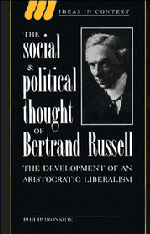Book contents
- Frontmatter
- Contents
- Acknowledgements
- Introduction
- 1 A young man of character
- 2 Fellow-travelling with the Fabians
- 3 Out of the moral gymnasium
- 4 Political science
- 5 The sage of Caxton Hall
- 6 Anarchist tendencies
- 7 Russia, China, and the West
- 8 The Wellsian trajectory
- 9 Ideologies and dystopias
- Epilogue: Russell and the idea of the clerisy
- Notes
- Bibliography
- Index
- IDEAS IN CONTEXT
9 - Ideologies and dystopias
Published online by Cambridge University Press: 31 August 2009
- Frontmatter
- Contents
- Acknowledgements
- Introduction
- 1 A young man of character
- 2 Fellow-travelling with the Fabians
- 3 Out of the moral gymnasium
- 4 Political science
- 5 The sage of Caxton Hall
- 6 Anarchist tendencies
- 7 Russia, China, and the West
- 8 The Wellsian trajectory
- 9 Ideologies and dystopias
- Epilogue: Russell and the idea of the clerisy
- Notes
- Bibliography
- Index
- IDEAS IN CONTEXT
Summary
In June 1930, Russell, in a letter to an old Cambridge acquaintance, Maurice Amos, comments as follows on his current lack of political enthusiasm: ‘I think you are entirely right in what you say about the Labour Party. I do not like them, but an Englishman has to have a Party just as he has to have trousers, and of the three Parties I find them the least painful.’ A little over a year later, the ‘least painful’ Party was in disarray, Oswald Mosley's ‘New Party’ had been formed, and the National Government entrenched in office. By 1932 Mosley's former parliamentary private secretary and one-time New Party member, John Strachey, had published The Coming Struggle for Power and the political formations of a peculiarly political decade began to take shape. Yet in a period which saw a dramatic politicisation of English intellectual life, Russell displayed a certain indifference even to those issues with which he might have been expected to engage passionately; indeed, it seems undeniable that he is strangely absent as an intellectual and political influence in the 1930s.
Russell was later to indicate that his political inactivity, and by extension his intellectual isolation, resulted from his being distanced from the prevailing radicalism on the question of the Soviet Union: ‘What is true is that, after the Russian Revolution, my dislike of the Russian regime made it difficult for me to cooperate with those Western Radicals who were, as I thought, being misled into support of totalitarianism.’
- Type
- Chapter
- Information
- The Social and Political Thought of Bertrand RussellThe Development of an Aristocratic Liberalism, pp. 184 - 208Publisher: Cambridge University PressPrint publication year: 1995



